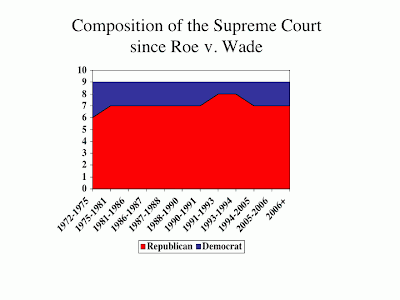• "An Obama presidency will [transform] our country into a socialist state."
This is just blather. I am a socialist, I know what socialism is, and a fundamentally bourgeois, corporate dominated state that throws a few meager benefits to the workers is not socialism! When most workers are unionized, when Social Security is turned into a genuinely equitable pension system, when great fortunes are not allowed to be passed down from generation to generation of rentier — then we might be close to socialism! Until then, speaking of “socialism” is just a lot of reactionary name-calling.
• "Mr. Obama will focus immediately on passing universal health care … [shifting] nearly 50 million Americans from private coverage to government-run care …"
No one is calling for “government-run care.” Under no plan that I have heard would the government own hospitals, run clinics, and be the sole employer of doctors. The proper analogy here is not to the government run Post Office, but to a simple government disbursement of funds to private providers. And government is good at that: the Social Security Administration, for instance, administers millions of individual accounts at a cost of less than 1% of the funds handled, far less than any investment firm charges.
• "The program's vast size and immense cost will lead to rising taxes …"
Okay, if we now pay about 16% of our GDP for health, and going to a single-payer system brings our costs in line with Europe, where they all have such systems and they cost about 8-10% of GDP, then we can expect to save about 6% of our GDP that is now wasted on health administration, legal fees, billing costs, etc,. That's right: the cost of health care will come down!
So, perhaps your taxes will go up somewhat, but your health care premiums would drop to nothing. Right now I pay about $600- a month to insure myself and my employees, and I probably pay half that much more on stuff that isn’t covered by my plan. You would have to more than double my income tax before single-payer insurance would cost me more.
• "The program's vast size and immense cost will lead to … the rationing of services.
Oh, and services aren’t rationed now?
When I had bronchitis last winter, I knew my health insurance wouldn’t cover it (deductible, you know), so I stayed away from the doctor for five months hoping it would clear up on its own. Tell me that isn’t rationing?
When my wisdom teeth began to ache from time-to-time in my mid-twenties I couldn’t afford to have them taken out. I had to wait until my mid-thirties, when they were fully impacted, and I needed surgery, which was covered, before they were taken out. Tell me that isn’t rationing?
Oh, we have rationing now, and, until we have an infinite supply of health care, we will continue to have rationing. The question is: will we have rationing by need or by wealth?
• " America's social programs will resemble those of statist Europe; we will also resemble the Continent's anemic growth rates, lower productivity and higher unemployment. America's culture of entrepreneurialism and technological dynamism will degenerate into one characterized by economic dependency and social stagnation."
Gee — Japan has had all of those polices for decades and that hasn’t stopped them from having a dynamic economy.
And how about this? Wages have gone down 30% in America since 1972, while in Europe they have about doubled in that time frame. All of our “dynamic growth” in that time has gone to make a few people ever more grotesquely rich which, when you think about it, really isn’t any kind of growth worth having.
• "[Mr. Obama] vows to lift or eliminate the cap on payroll taxes, which funds Social Security and Medicare. Hence, a tax designed to maintain a pension insurance system will be used for the redistribution of wealth."
I hate that phrase “redistribution of wealth." It implies that there was some sort of Divinely Ordained and infinitely just original distribution of wealth, instead of an inherently flawed and corrupt market system that routinely rewards speculators, pornographers, and marketers pandering to our worst desires, while neglecting teachers, farmers, and innumerable others who actually contribute to the well being of society.
But, just in case you still balk at any form of “redistribution of wealth,” check out what Pope Pius said in Quadragesimo Anno:
“[It is the] function of government to adjust ownership to meet the needs of the public good.”• "… to forge a new Democratic majority, felons will be given the right to vote, and the District of Columbia will be granted congressional representation - meaning more Democratic seats."
As opposed to, say, the way the Republicans routinely disenfranchised Florida voters who merely had the same name as felons? Or the Republican gerrymandering in the Southern states that routinely denies representation to white Democrats? Or the Diebold voting machines that routinely throw out votes for the Democratic ticket?
Now, I don’t really don’t feel strongly about the issue, but the idea that once a man has paid his debt to society he ought to regain the full rights of a citizen doesn’t strike me as unreasonable. Nor does it strike me as particularly fair that the Republican stronghold of Wyoming should get two senators while the District of Columbia, with at least a hundred thousand more residents, should not.
• "The Obama-Pelosi-Reid unholy alliance will complete the revolutionary project of the 1960s: a society stripped from its traditional Christian moorings."
Okay, who’s the churchgoer: Obama or McCain? Obama is a different kind of Democrat precisely because he is a believing Christian. I get sick of reactionaries calling anyone to the left of Ronald Regan (who wasn’t religious at all, if you will remember) “anti-Christian,” as if Martin Luther King, Eugene McCarthy, and Dorothy Day had never existed.
Sure Pelosi and Reid are largely secular, but is the bad religion of George W. Bush better? Is religion used to justify imperialism, genocide, and an erosion of our civil rights real piety, or is it a fraud? Sure, a lot of people on the left are totally secular — about as secular as those godless Libertarians!
• "Finally, his administration will consolidate a liberal Supreme Court and thus advance the leftist social agenda of abortion on demand …"
Wait, wait, wait! It was a Republican dominated court that put through Roe v. Wade! Only two of the last nine Republican nominees to the court have opposed it! Saying that Republican court nominees would be better on the life issue is criminally naive.
• " … the decriminalization of prostitution, the legalization of marijuana and euthanasia."
Oh, cut it out! No one’s talking about anything like that. This is just scare mongering of the worst possible sort.
Let’s give this man a chance, huh? Things have gone terribly wrong under Bush. We are engaged in an immoral war of imperialism, the economy is deep in depression, the distribution of wealth is almost at third-world imbalances, working-class income has been stagnant for three decades, our infrastructure is crumbling, or foreign debt is crushing, and our prestige in the world is at an all time low. Barack Obama is a bright young man who is not tied to the old ideas of sixties liberalism. Have you been listening to what he has been saying about the recent financial crisis? The man is talking sense and I feel the quality of government is going to improve almost immediately.






























